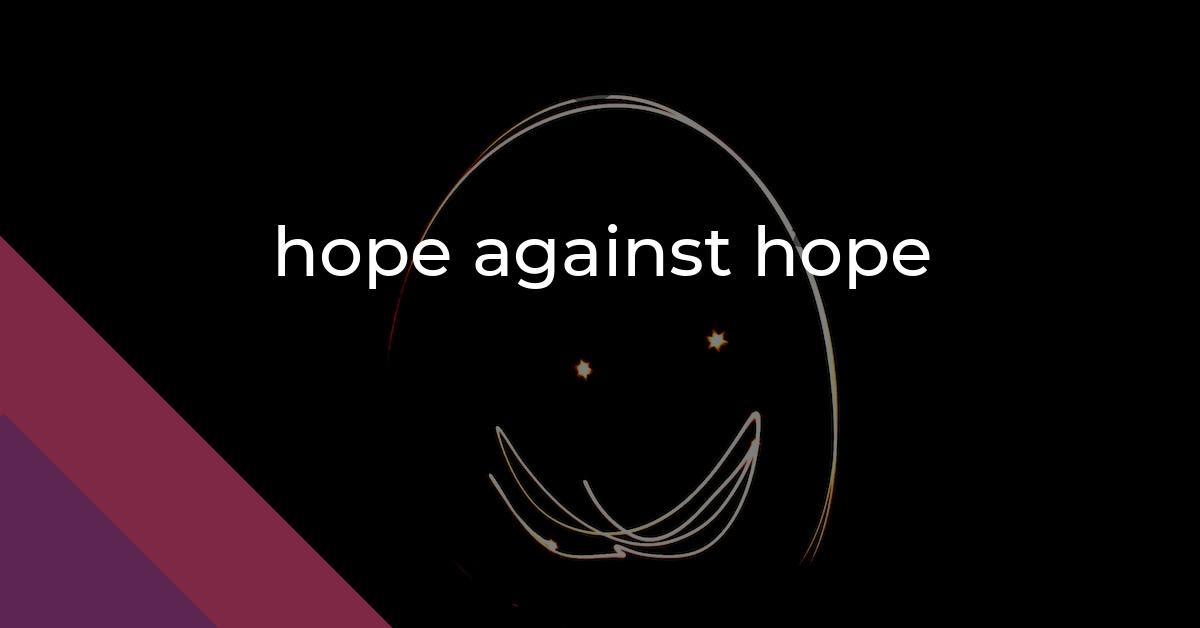hope against hope: Idiom Meaning and Origin
What does ‘hope against hope’ mean?
The idiom "hope against hope" means to continue hoping for something despite there being little or no chance of it happening.

Idiom Explorer
The idiom "in one's dreams" means that something is unlikely or impossible to happen. It is often used to dismiss someone's unrealistic or fanciful ideas.
The idiom "if only" is used to express a strong wish or regret about something that is impossible or unlikely to happen. It conveys a sense of nostalgia or longing for a different outcome.
The idiom "if anything" is used to express the idea that something is unlikely or even the opposite of what is expected. It introduces a slight doubt or contradiction in a statement.
The idiom "hiding to nothing" means to be in a situation where one is bound to fail or face certain defeat, regardless of the efforts made. It implies a futile or hopeless endeavor with no chance of success or favorable outcome.
The idiom "here goes nothing" is used when someone is about to attempt something with little expectation of success. It conveys a sense of uncertainty or resignation about the outcome of the action.
The idiom "grasp at straws" means to make a desperate attempt or effort when facing a difficult or hopeless situation, often by using any available option or possibility, no matter how unlikely or weak it may be.
The idiom "give something a go" means to try or attempt something, even if you are unsure of the outcome.
Meaning: To become optimistic or expectant about something, often to later be disappointed when it doesn't happen as anticipated.
The Last Glimmer
One idiom that has long been a part of the English language is "hope against hope." This phrase carries a deep sense of desperation and longing, suggesting a belief in a seemingly impossible outcome. The true origins and meanings of this idiom beyond its biblical roots remain somewhat ambiguous, but its significance in everyday conversations is clear.
The idiom "hope against hope" has roots that can be traced back to the 18th century. It is believed to have originated from the biblical book of Romans, specifically from the King James Version, where the phrase "against hope believed in hope" appears. Over time, this expression evolved and became the commonly used idiom we know today.
The meaning behind "hope against hope" is clear: it refers to holding onto hope even when it seems unlikely or impossible. This idiom encapsulates the human need for optimism and the refusal to give up even in the face of overwhelming odds. It suggests a persistent belief in a positive outcome, despite all evidence to the contrary.
When someone uses the expression "hope against hope," they are conveying a sense of deep yearning and longing. It implies that they are desperately holding onto their hopes, often accompanied by a sense of doubt or skepticism. The idiom can be used in a wide range of contexts, from personal dreams and aspirations to societal or political situations.
Considering the impact of this idiom in conversations, it becomes evident that its power lies in the emotional depth it conveys. "Hope against hope" touches on universal human experiences, reminding us of our innate desire to believe in the improbable. It resonates with people across cultures and generations, offering solace and inspiration during challenging times.
One related idiom that closely aligns with "hope against hope" is "against all odds." This phrase emphasizes the idea of defying improbability and overcoming seemingly insurmountable obstacles. When one hopes against hope, they are essentially hoping to achieve something against all odds, against all the circumstances that suggest failure or defeat.
Another related idiom is "fighting chance." This expression highlights the resilience and determination required to overcome adversity. When hoping against hope, one is holding onto a fighting chance, refusing to give in to the circumstances that may suggest otherwise. It speaks to the tenacity and spirit needed to persevere and achieve success.
Lastly, there is the idiom "get one's hopes up." This phrase warns against becoming too optimistic or excited about something, as it may lead to disappointment if the desired outcome does not materialize. When one hopes against hope, there is often a cautious optimism, a delicate balance between holding onto hope and keeping expectations realistic.
While the idiom "hope against hope" is well-established in the English language, its true origins and meanings beyond its biblical roots remain somewhat ambiguous. The intricacies of the phrase continue to intrigue scholars and language enthusiasts alike. Further exploration into the historical usage of the idiom, its literary appearances, and its cultural impact could shed more light on its nuanced significance.
The idiom "hope against hope" is a powerful expression that reflects the indomitable human spirit. Its origins can be traced back to the Bible, but its meaning has evolved into a symbol of unwavering optimism and resilience. It resonates with people from all walks of life, serving as a reminder to never give up on our dreams and aspirations, no matter the odds. While its exact historical context and intricate nuances may elude us, the enduring relevance of this idiom reminds us of the limitless possibilities that hope can bring.
Example usage
Examples:
- I hope against hope that I will pass the exam, even though I didn't study enough.
- She hoped against hope that her lost purse would be returned, but deep down she knew it was unlikely.
- Despite the odds, the team hoped against hope that they would win the championship.
The idiom "hope against hope" means to continue hoping for something, even though it seems unlikely or hopeless. It implies a sense of desperation and holding onto hope despite rational expectations. In each of the examples provided, the speakers express their persistent hope for a desired outcome, despite the circumstances suggesting otherwise.
More "Desperation" idioms



